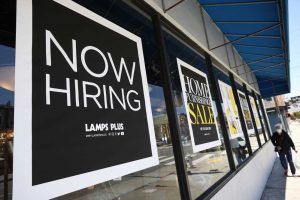US workers file 376,000 new jobless claims, signaling a recovering labor market

More On:
Jobs
Job openings soar to new record as workers stay on sidelines
Workers are rage-quitting crappy jobs as COVID pandemic slows
Getting fired doesn’t make you a failure — here’s how to get back on track
UK mom’s jokey ‘I Quit’ resignation to boss backfires
The number of Americans seeking new unemployment benefits fell again last week to a fresh pandemic low, the feds said Thursday.
Initial worker filings for jobless claims, seen as a proxy for layoffs, reached 376,000 last week, down from 385,000 reported the prior week, according to data released Thursday by the Labor Department.
It’s the sixth consecutive week of steady declines, but initial claims still remain substantially higher than pre-pandemic levels. The country was averaging just over 200,000 new claims per week in 2019.
The downward trend of new claims is an indication of a labor market that appears to be healing, albeit slower than some economists expected earlier this year.
The US added 559,000 jobs last month, fewer than the 671,000 expected by economists, with some hailing the figure as a sign of progress and others saying US hiring continues to disappoint.
As of mid-May, more than 15.4 million Americans remained on some form of government assistance through all unemployment programs.
That data comes even as US job openings soared to a new record 9.3 million in April, according to data released this week from the Labor Department.
Millions of those Americans on unemployment benefits could also soon see their benefits slashed, as at least 25 states are now looking to lure workers back into the labor market by withdrawing from the federal program that provides an extra $300 in additional unemployment benefits every week.
President Joe Biden confirmed last week that he would let the federal unemployment benefits program expire after Labor Day, but some states will pull out of it as soon as this week.
Some companies, politicians and economists have said the extra benefits add up to more than what businesses can afford to pay people, particularly for entry level jobs.
Companies have reported struggles to recruit new workers amid the reopening, with many citing the pandemic-boosted federal unemployment benefits as a cause. Other reasons for the labor crunch include fear of getting COVID-19 and school closures keeping parents at home, economists say.
Some economists have warned that the labor shortage could hold back the US economic recovery, while others have urged patience as businesses grapple with temporary issues in the hiring pool.
The White House has defended the extra benefits, saying that businesses should pay people more.
But many economists are growing increasingly worried about wage inflation driving prices up. Companies have already begun raising prices, blaming higher labor and supply costs.
Chipotle, for example, has raised its menu prices by up to 4 percent to cover the costs of higher wages for employees. Executives from other major companies, including General Mills, Unilever and JM Smucker, have also warned recently about rising costs and inflationary pressures.
Share this article:
Source: Read Full Article

